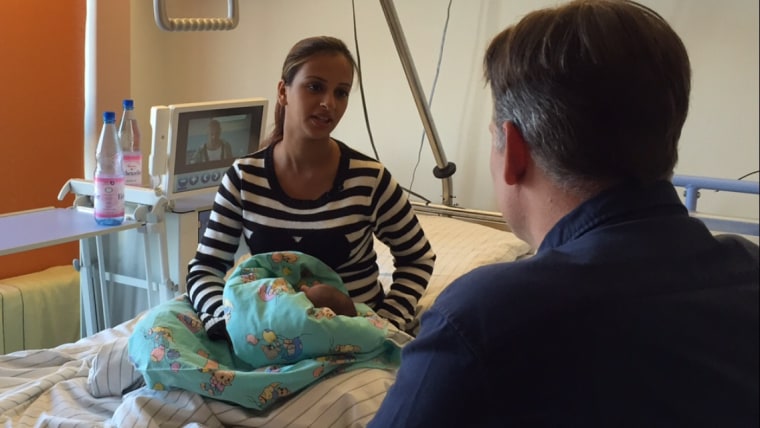FULDA, Germany — The small-town hospital here was serenely quiet.
Inside her room, Zeinab Khalaf was lying back in a neatly made bed holding a newborn child in her arms. The smile on the 19-year-old Syrian refugee’s face revealed nothing of the hardships she and her family had to go through for her boy to be born on German soil.
We first met Zeinab at the Serbian border in mid-September.
Police had just fired tear gas against her and her compatriots in an attempt to stop them from crossing into Hungary.
After Zeinab inhaled the gas, in what she says was one of her darkest hours, she collapsed in front of our eyes — and camera.
“My fear was not for myself, it was mostly for the baby,” she says. “I was living on the hope that he was moving in my stomach and he's alive.”
To escape the civil war in Syria, Zeinab and her husband had to pass through at least six countries. Now, in the safety and warmth of a hospital bed Zeinab still remembers the four times she attempted to cross the Aegean sea between Turkey and Greece, only to find herself stranded in its waters.
“When [the boat] capsized,” she recalls, “everyone was crying and yelling. We thought we weren’t going to survive. We washed our hands of this world.”
Having survived the sea crossing, and on legs still bruised from the fall she had taken in Serbia, the heavily pregnant Zeinab had to trek to Croatia and then travel to Hungary and onto Austria.
“I was scared,” she says, “I had no choice but to keep up so we wouldn’t get lost.”
It took her 23 days to reach Germany, where a doctor examined her for the first time in months. “I was finally happy,” she says.
Born at 5.7 pounds, her son is born perfectly healthy today despite the hardship his mother suffered while carrying him. And he’s not alone.
Thousands of refugees have landed on Europe’s shores over the past few months, desperate to escape Syria, Afghanistan, Iraq and other war-torn and impoverished nations. Many of them are mothers just like Zeinab, who carry in their arms, or wombs, babies who are becoming Europe’s new children.
Dr. Cornelia Schu heads an umbrella group of experts who advise the German government on migration issues. Asked how Europe will cope with the vast numbers of young children arriving here, she shakes her head in bewilderment.

“I think it’s a long way,” she says. “Nobody told us so many persons would come.”
Zeinab’s experience shows that Germany was not prepared for her or for her newborn baby. When they leave the modern hospital where he was born, she and the baby, who was appropriately named Azad, which means “freedom” in the Kurdish language, will go back to a refugee camp on the outskirts of Fulda.
Germany, the economic powerhouse of the European Union, can only offer Azad, his mother says, a tent as a first home for the winter to come.
All of this worries Zeinab, but she doesn’t regret taking the perilous journey that brought her here. “I want him [Azad] to be a German citizen,” she says.
But being born in Germany does not guarantee a baby a German passport. Only those born to parents who have been legal residents for at least eight years are automatically granted citizenship. Yet, according to Dr. Schu, Syrians who apply for asylum are granted the right to stay on about 88 percent of the cases, which means Azad will probably get the chance to grow up in prosperous Germany, far from the war his parents escaped.
Dr. Schu knows that these newcomers will be a strain on Europe’s economies and societies in the short run. But she and many others here in Germany are optimistic that children like Azad will grow up in a more tolerant and diverse Europe than the one they were born into.
“I am sure Europe will change, will have to change,” she says.
Meanwhile, Zeinab's family and friends have set up a GoFundMe site to raise money for her and her son.
